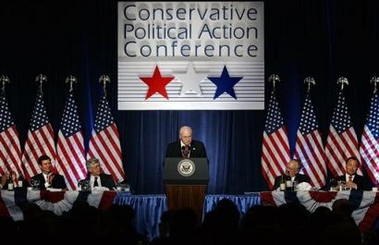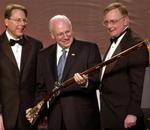Perhaps most surprising to outsiders concerning the surprise defection of David Emerson was the reaction of Tories to what observers in other parties would claim as a stealth coup. The Liberals were outraged, but the NDP seemed to be the most vocal about Emerson’s defection. Protests are building in BC, mostly due to the NDP candidate who would have the most to gain from a by-election which would see Emerson likely losing his seat to that party which ran #2.
The only thing that Tories find insulting about the Emerson affair was that it went against some of the core principles of the legacy Reform/Alliance parties which drafted policy concerning MP recalls and mused quite openly about the very topic of floor crossing. However in the real-world of Parliamentary practice, the actions of floor crossers such as Emerson and Stronach are perfectly within the bounds of legality.
After recovering from our principle-induced hangover, a second look at cabinet reveals that it’s not really all that bad. It’s actually quite good.
One realizes that Stephen Harper is reaching out to all areas of Canada whether it elected a Conservative or not. The Prime Minister is practising pragmatic politics and will end up gaining more from the two controversial cabinet appointments than he invested. If Emerson solves the softwood lumber trade dispute and if Michael Fortier, as a Quebecker, cleans up the ministry that so-enraged Quebeckers, Stephen Harper will take his minority and drive it towards offering a pan-Canadian majority to all Canadians. Pair success in these two portfolios with a 1% GST reduction, various income tax credits passed and the $1200 childcare credit, the Harper long-term majority government plan appears that it has been on track since day one.
Media pundits have noted that the “Harper honeymoon” with the media lasted about one hour. However, when one actually measures the concept, what exactly is the benefit of a “honeymoon” period with the press anyways? Harper’s government is only vulnerable to a majority of members from the Liberals, the NDP and the Bloc Quebecois. The latter two would rather wait for a year or more to pass before facing the electorate again and the Liberals are currently on the long end of an uninspiring leadership election. If we are to believe in a “honeymoon period” with the press, it was only a matter of arbitrary time before the press would sour on Harper. The Prime Minister decided to make a controversial political investment (for high future dividends) at a time when the chattering classes were pre-occupied with the pomp and pagentry of the installation of a new government. We saw a somewhat similar move by the Conservative Party leader during the first few hours of the election; Harper unloaded the controversy of the party’s same-sex marriage position at the least damaging time and by doing so, the future Prime Minister was able to diffuse controversy early and at the most optimal time.
But as many have done, politics has been measured against principle and as conservatives, many of us immediately recognized the discrepancy between what we believe and what Harper did to advance the ‘big-C’ Conservative brand in Canada. Can purists only exist in opposition? Does pragmatism separate successful Prime Ministers from failures? We certainly find our roots in conservative philosophy, however the game of politics cannot be won on ideological purity.
While virtually everyone from the Reform tradition understood their uneasyness with Harper’s controversial cabinet picks, those who represent us in government have a role to speak out. They can do so in caucus for there they have a forum to voice their concerns directly to the source of their discontent. For those in the House of Commons, and for those that enjoy being in the position of governance, airing Conservative discontent to the media is neither pragmatic nor principled. If one argues that the people of Vancouver-Kingsway elected a Liberal, not a Conservative, then one could argue that the people of Halton elected a Conservative, not a maverick or an independent. Further, the Conservative caucus is 125 members strong. In caucus, everyone gets an equal opportunity to speak. In the media, the spotlight shines bright upon the maverick.
Yes, in our system, we elect individuals to represent our ridings in the House of Commons. We do not elect parties. For those outside of the conservative movement that have shown disgust with Emerson’s defection, they also show opportunism and intellectual dishonesty. The NDP has been arguing for their own flavour of electoral reform for quite some time and they prefer a system of proportional representation. A shift towards a PR system would move from our traditional system to one that emphasizes party over the individual. A variety of systems exist under the PR framework and most, if not all, do not give electors a direct choice concering the individual represents them. Most PR systems give party leaders more power in choosing representatives whether to run or to represent. Those that complain about Emerson the partisan have a weaker argument than those that complain about Emerson the man. After all, Emerson the man won a plurality of votes in our electoral system which emphasizes the individual over party on the ballot.
In the days after the Emerson defection, columnist Andrew Coyne remarked that the Blogging Tories were doing more to oppose Emerson’s electoral flip-flop than members of more liberally-partisan blogging groups. I wondered how Blogging Tories would evolve in the weeks leading up to and following Stephen Harper’s victory on January 23rd. Our blogroll represents a variety of conservative voices from libertarian to social conservative, from fiscal conservatives to neo-conservatives. How would the diversity of voices in this organization behave now that our political favourites had secured power? First, the Blogging Tories as an organization is accountable to no one political entity. As Blogging Tories, we are not elected and we represent nobody but ourselves as individual observers of politics. With that said, we certainly have our preference as to which party we’d like to govern this country.
Balancing both of these considerations, Blogging Tories is a group of individuals that may commend and criticize freely while by doing so, they promote the overall success of conservative politicians. Do we hurt the Conservative Party and Stephen Harper by speaking out against bad policy and bad judgement? Blogging Tories serves as a feedback mechanism that can finely adjust the evolutionary path of the party. Since we represent nobody but ourselves the media may sum up our representative opinions as such. When Garth Turner speaks out against Stephen Harper he does so with the weight of a 100,000 person constituency. While this constituency elected Garth Turner the man, he should appreciate the party in which he also sits. As an MP and as a Conservative member, Turner certainly has the right to make his discontent known but if he chooses to sit as a Conservative (with the support of caucus and the party) he should appreciate his other commitments. Blogging Tories represents a raw grassroots discourse of ideas which will ultimately help shape the policy and politics of the Conservative party and government of Stephen Harper. While Garth Turner represents his constituents, he should also be mindful of the role he plays as a colleague in the Conservative caucus.
Blogging Tories will continue to serve up grassroots opinion concerning conservative principles, our Conservative MPs will continue to represent constituents and the grassroots in caucus and the Prime Minister will measure these principles and integrate them into a pragmatic, principled and appropriate course of action. Stephen Harper was elected to lead our party and thus our party has chosen to allow him to give it direction. A party acting solely upon principles would seem to sail smoothly upon calm waters. However, in the choppy sea of Ottawa politics, a trusted and pragmatic rudder to guide the good ship Conservative is a necessity.
 On Friday at CPAC, US Vice President Dick Cheney gave a typical stump speech which including the usual topics such as the war on terror and US security and he made reference to the State of the Union address, particularly on the US dependence on oil. I was unable to procure tickets at the last minute and friends say that it was interesting to hear but seemed a little rushed. We’d later find out that Cheney was to soon depart to Texas to for an annual quail hunt with friends. Unfortunately, Mr. Cheney hunting group suffered an accident when the VP, when targeting a quail, peppered his friend Harry Whittington with shotgun pellets.
On Friday at CPAC, US Vice President Dick Cheney gave a typical stump speech which including the usual topics such as the war on terror and US security and he made reference to the State of the Union address, particularly on the US dependence on oil. I was unable to procure tickets at the last minute and friends say that it was interesting to hear but seemed a little rushed. We’d later find out that Cheney was to soon depart to Texas to for an annual quail hunt with friends. Unfortunately, Mr. Cheney hunting group suffered an accident when the VP, when targeting a quail, peppered his friend Harry Whittington with shotgun pellets.

